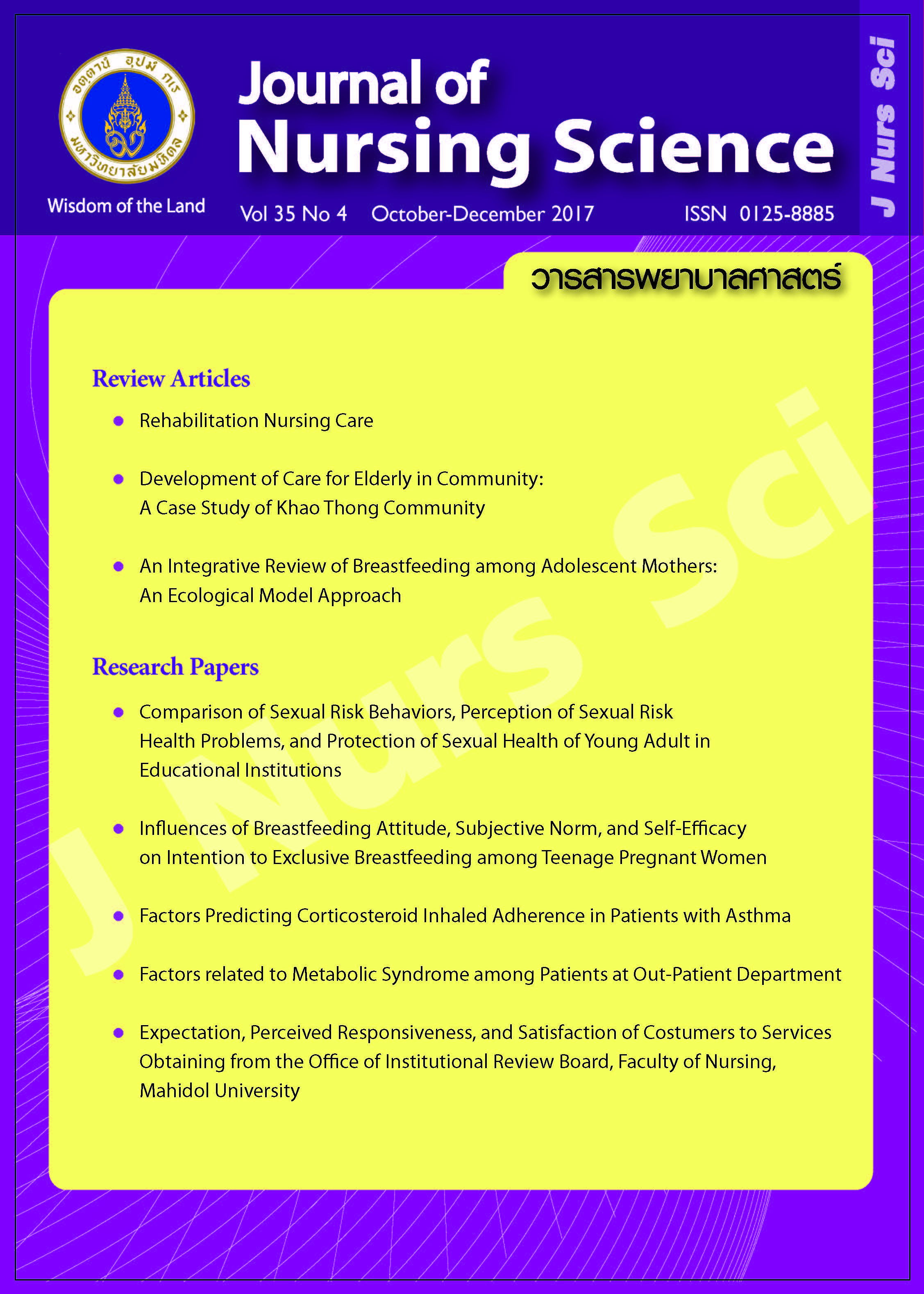Influences of Breastfeeding Attitude, Subjective Norm, and Self-Efficacy on Intention to Exclusive Breastfeeding among Teenage Pregnant Women อิทธิพลของทัศนคติ การคล้อยตามกลุ่มอ้างอิง และการรับรู้สมรรถนะแห่งตนต่อความตั้งใจในการเลี้ยงลูกด้วยนมแม่อย่างเดียวในสตรีตั้งครรภ์วัยรุ่น
Main Article Content
Abstract
Purpose: This study aimed to investigate the predictive power of breastfeeding attitude, subjective norm, and self-efficacy on intention to exclusive breastfeeding among teenage pregnant women.
Design: Predictive correlational design.
Methods: The sample consisted of 143 teenage pregnant women receiving antenatal care at one hospital in Chiang Rai province. Instruments included the Demographic Characteristics Interview, the Exclusive Breastfeeding Intention Interview, the Breastfeeding Attitude Questionnaire, the Breastfeeding Subjective Norm Questionnaire, and the Breastfeeding Self-Efficacy Scale-Short Form. Data were analyzed using descriptive statistics and Multiple Linear Regression.
Main findings: The findings revealed that breastfeeding attitude, breastfeeding subjective norm, and self-efficacy were accounted for 29.2% of variance in exclusive breastfeeding among teenage pregnant women (R2 = .292, F = 19.070, p < .05). Breastfeeding subjective norm, and breastfeeding self-efficacy could predict intention to exclusive breastfeeding among teenage pregnant women with statistical significance (β = .463, .181, p < .05, respectively).
Conclusion and recommendations: Breastfeeding subjective norm and self-efficacy affected intention to exclusive breastfeeding. Therefore, it is suggested that nurses and midwives should promote exclusive breastfeeding intention and have their mothers and husbands participate in breastfeeding as well as promote breastfeeding self-efficacy in teenage pregnant women.
บทคัดย่อ
วัตถุประสงค์: เพื่อศึกษาอำนาจการทำนายของทัศนคติในการเลี้ยงลูกด้วยนมแม่ การคล้อยตามกลุ่มอ้างอิง และการรับรู้สมรรถนะแห่งตนในการเลี้ยงลูกด้วยนมแม่ ต่อความตั้งใจในการเลี้ยงลูกด้วยนมแม่อย่างเดียวในสตรีตั้งครรภ์วัยรุ่น
รูปแบบการวิจัย: การศึกษาความสัมพันธ์เชิงทำนาย
วิธีดำเนินการวิจัย: กลุ่มตัวอย่างเป็นสตรีตั้งครรภ์วัยรุ่น จำนวน 143 คน ที่มาฝากครรภ์ ณ โรงพยาบาลแห่งหนึ่ง ในจังหวัดเชียงราย เก็บข้อมูลด้วยแบบสัมภาษณ์ข้อมูลส่วนบุคคล แบบสัมภาษณ์ความตั้งใจในการเลี้ยงลูกด้วยนมแม่อย่างเดียว แบบสอบถามทัศนคติในการเลี้ยงลูกด้วยนมแม่ แบบสอบถามการคล้อยตามกลุ่มอ้างอิงในการเลี้ยงลูกด้วยนมแม่ และแบบสอบถามการรับรู้สมรรถนะแห่งตนในการเลี้ยงลูกด้วยนมแม่ วิเคราะห์ข้อมูลโดยใช้สถิติพรรณนา และการถดถอยเชิงเส้นพหุคูณ
ผลการวิจัย: ทัศนคติ การคล้อยตามกลุ่มอ้างอิง และการรับรู้สมรรถนะแห่งตน สามารถร่วมกันทำนายความตั้งใจในการเลี้ยงลูกด้วยนมแม่อย่างเดียวในสตรีตั้งครรภ์วัยรุ่นได้ร้อยละ 29.2 (R2 = .292, F = 19.070, p < .05) การคล้อยตามกลุ่มอ้างอิง และการรับรู้สมรรถนะแห่งตนสามารถทำนายความตั้งใจในการเลี้ยงลูกด้วยนมแม่อย่างเดียวในสตรีตั้งครรภ์วัยรุ่นได้อย่างมีนัยสำคัญทางสถิติ (β = .463, และ .181, p < .05 ตามลำดับ)
สรุปและข้อเสนอแนะ: พยาบาลผดุงครรภ์ควรเสริมสร้างความตั้งใจในการเลี้ยงลูกด้วยนมแม่อย่างเดียวในสตรีตั้งครรภ์วัยรุ่น โดยให้แม่และสามี มีส่วนร่วม รวมทั้งส่งเสริมการรับรู้สมรรถนะแห่งตนในการเลี้ยงลูกด้วยนมแม่ในสตรีตั้งครรภ์วัยรุ่น
Article Details
Copyright Notice: Nursing Science Journal of Thailand has exclusive rights to publish and distribute the manuscript and all contents therein. Without the journal’s permission, the dissemination of the manuscript in another journal or online, and the reproduction of the manuscript for non-educational purpose are prohibited.

Disclaimer: The opinion expressed and figures provided in this journal, NSJT, are the sole responsibility of the authors. The editorial board bears no responsibility in this regard.
References
2. Biks GA, Berhane Y, Worku A, Gete YK. Exclusive breastfeeding is the strongest predictor of infant survival in Northwest Ethiopia: a longitudinal study. J Health Popul Nutr. 2015;34:9. doi: 10.1186/s41043-015-0007-z. PubMed PMID: 26825334; PubMed Central PMCID: PMC5025980.
3. Puapompong P, Raungrongmorakot K, Manolerdtewan W, Ketsuwan S, Wongin S. Teenage pregnancy and exclusive breastfeeding rates. J Med Assoc Thai. 2014;97(9):893-8.
4. Nesbitt SA, Campbell KA, Jack SM, Robinson H, Piehl K, Bogdan JC. Canadian adolescent mothers' perceptions of influences on breastfeeding decisions: a qualitative descriptive study. BMC Pregnancy Childbirth. 2012;12:149. doi: 10.1186/1471-2393-12-149. PubMed PMID: 23234260; PubMed Central PMCID: PMC3534235.
5. Sipsma HL, Magriples U, Divney A, Gordon D, Gabzdyl E, Kershaw T. Breastfeeding behavior among adolescents: initiation, duration, and exclusivity. J Adolesc Health. 2013;53(3):394-400.
6. Meedya S, Fahy K, Kable A. Factors that positively influence breastfeeding duration to 6 months: a literature review. Women Birth. 2010;23(4):135-45.
7. Phahuwatanakom W, Soothampitag M. Comparison of breastfeeding problems during early postpartum between mothers with exclusive breastfeeding and mothers with non-exclusive breastfeeding at 1 month. Journal of Nursing Science. 2013;31 Suppl 2:57-66. (in Thai).
8. Sipsma HL, Divney AA, Magriples U, Hansen N, Gordon D, Kershaw T. Breastfeeding intentions among pregnant adolescents and young adults and their partners. Breastfeed Med. 2013;8(4):374-80.
9. Leclair E, Robert N, Sprague AE, Fleming N. Factors associated with breastfeeding initiation in adolescent pregnancies: a cohort study. J Pediatr Adolesc Gynecol. 2015;28(6):516-21.
10. Alexander A, O'Riordan MA, Furman L. Do breastfeeding intentions of pregnant inner-city teens and adult women differ? Breastfeed Med. 2010;5(6):289-96.
11. Ajzen I. The theory of planned behavior. Organ Behav Hum Decis Process. 1991;50(2):179-211.
12. Giles M, Connor S, McClenahan C, Mallet J. Attitudes to breastfeeding among adolescents. J Hum Nutr Diet. 2010;23(3):285-93.
13. Swanson V, Power K, Kaur B, Carter H, Shepherd K. The impact of knowledge and social influences on adolescents' breast-feeding beliefs and intentions. Public Health Nutr. 2006;9(3):297-305.
14. Ajzen I. Perceived behavioral control, self-efficacy, locus of control, and the theory of planned behavior. J Appl Soc Psychol. 2002;32(4):665-83.
15. Mitra AK, Khoury AJ, Hinton AW, Carothers C. Predictors of breastfeeding intention among low-income women. Matern Child Health J. 2004;8(2):65-70.
16. UNICEF-Thailand. Situation analysis of adolescent pregnancy in Thailand: Synthesis report 2015. Bangkok: UNICEF Thailand; 2015.
17. The National Statistical Office, UNICEF-Thailand. Results from: Thailand multiple indicator cluster survey (MICS) December 2005-May 2006. Bangkok: The National Statistical Office, Ministry of Information Technology and Communications and UNICEF; 2015.
18. Nguyen Q, Deoisres W, Siriarunrat S. Factors predicting degree of intention for exclusive breastfeeding among Vietnamese pregnant women. Journal of Science, Technology, and Humanities. 2013;11(1):35-42.
19. Dennis CL. The breastfeeding self-efficacy scale: psychometric assessment of the short form. J Obstet Gynecol Neonatal Nurs. 2003;32(6):734-44.
20. Thussanasupap B. The effects of systematic instructional program on breastfeeding self-efficacy, nipple pain, nipple skin changes and incision pain of cesarean mothers [master’s thesis]. Bangkok: Mahidol University; 2006. 110 p. (in Thai).
21. Tavakol M, Dennick R. Making sense of Cronbach’s alpha. Int J Med Educ. 2011;2:53-5. doi: 10.5116/ijme.4dfb.8dfd. PubMed PMID: 28029643; PubMed Central PMCID: PMC4205511.
22. United Nations Children’s Fund (UNICEF). The state of the world's children 2011 adolescence: an age of opportunity. New York, NY: UNICEF; 2011.
23. Giles M, Connor S, McClenahan C, Mallett J, Stewart-Knox B, Wright M. Measuring young people's attitudes to breastfeeding using the Theory of Planned Behaviour. J Public Health (Oxf). 2007;29(1):17-26.
24. Thomas JS, Yu EA, Tirmizi N, Owais A, Das SK, Rahman S, et al. Maternal knowledge, attitudes and self-efficacy in relation to intention to exclusively breastfeed among pregnant women in rural Bangladesh. Matern Child Health J. 2015;19(1):49-57.


